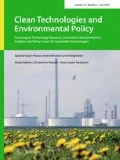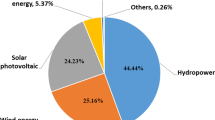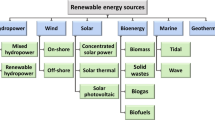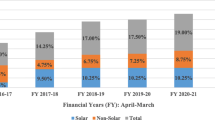Abstract
In present study, energy transition from fossil-based to renewable energy of Turkey was compared with Germany, which is one of the world leaders, in order to analyze for which points Germany is a good model for Turkey. The renewable energy policies, strengths/weakness and targets of Germany and Turkey were examined and compared. Germany has the 4th largest economy whereas Turkey, which is a developing country has the 18th largest economy in of the world. Germany declared to have the renewable energy in the energy mix by 65% in 2030 and set the long-term targets as: to reach at least 60% of final energy and 80% of electricity consumption from renewable sources by the year 2050. Turkey is expected to reach ~ 63 GW installed renewables in 2023, which was 42 GW. Germany and Turkey have similarities for the energy security since both are fossil-based and import-dependent countries. The import quotas of Germany are 99% for oil and 96% for natural gas and quotas of Turkey are 93.2% for oil and 99.2% for natural gas. Turkey with “More Domestic, More Renewable” policy wants to reduce the foreign dependency rate and reduce the primary energy consumption by 14% by the year 2023. Germany aims to reduce the greenhouse gas emission by 40% by the year 2020 and in long-term by 80–95% in 2050 as compared to the level of 1990. Turkey declared an intention to decrease the emission by 21% by the year 2030. One of the differences between Germany and Turkey is that Germany aims to shut down the nuclear power in 2022 whereas Turkey, for the first time, is going to have nuclear power in the energy mix in 2023.
Graphic abstract





Similar content being viewed by others
References
AA Energy (2019) Turkey set to be among Europe’s top 5 renewable leaders. https://aa.com.tr/en/energy/renewable/turkey-set-to-be-among-europes-top-5-renewable-leaders/27069. Accessed 05 Jan 2020
Abbott A (2019) Six teams vie for billion-euro funding. Nature 566:164–165
Agora Energiewende (2019) The German Coal Commission: a roadmap for a just transition from coal to renewables. https://agora-energiewende.de/en/publications/the-german-coal-commission/. Accessed 31 March 2020
Appunn K, Wettengel J (2020) Germany’s greenhouse gas emissions and climate target. https://cleanenergywire.org/factsheets/germanys-greenhouse-gas-emissions-and-climate-targets. Accessed 01 Mar 2020
Appunn K, Haas Y, Wettengel J (2020) Germany’s energy consumption and power mix in charts. https://cleanenergywire.org/factsheets/germanys-energy-consumption-and-power-mix-charts. Accessed 18 Mar 2020
Auer J (2019) Natural gas as a transnational source of energy. https://dbresearch.com/PROD/RPS_EN-PROD/PROD0000000000502453/Natural_gas_as_a_transitional_source_of_energy%3A_Ho.PDF. Accessed 01 Feb 2020
Baris K, Kucukali S (2012) Availability of renewable energy sources in Turkey: current situation, potential, government policies and the EU perspective. Energy Policy 42:377–391
Bayraktar A (2018) Energy Transition in Turkey. Turkish Policy Q 17(3):19–26
Bayraktar Y, Kaya Hİ (2016) Yenilenebilir Enerji Politikaları ve Rüzgâr Enerjisi Açısından Bir Karşılaştırma: Çin, Almanya ve Türkiye Örneği. Uluslararası Ekonomik Araştırmalar Dergisi 4:1–18
BMWi (2011) Research for an environmentally sound, reliable and affordable energy supply. https://bmwi.de/Redaktion/EN/Publikationen/research-for-an-environmentally-sound-reliable-and-affordable-energy supply.pdf?__blob = publicationFile&v = 3. Accessed 01 Feb 2020
BMWi (2016) Hydroelectric power. https://german-energy-solutions.de/GES/Redaktion/EN/Text-Collections/EnergySolutions/EnergyGeneration/hydroelectric-power.html. Accessed 12 Mar 2020
BMWi (2018) Renewable energy sources in figures National and International Development, 2018. https://bmwi.de/Redaktion/EN/Publikationen/renewable-energy-sources-in-figures-2018.pdf?__blob=publicationFile&v=2. Accessed 13 Mar 2020
BMWi (2020) Renewable Energy. https://bmwi.de/Redaktion/EN/Dossier/renewable-energy.html. Accessed 12 Mar 2020
Carbon Brief (2018) The Carbon Brief Profile: Turkey. https://carbonbrief.org/carbon-brief-profile-turkey. Accessed 25 Dec 2019
Cebeci S (2017) Utilization of Solar Electricity Generation Potential in Turkey. Dissertation The Republic of Turkey Ministry of Development
Cheng C, Bing X, Guotian C, Heiko T, Stefan S (2019) Comparing the energy transitions in Germany and China: synergies and recommendations. Energy Rep 5:1249–1260
Chowdhury, S S (2019) Top 10 leading countries in Global Solar Power Generation in 2018. https://isolarworld.com/blog/Top-ten-leading-countries-in-solar-power-generation/. Accessed 12 Mar 2020
Clean Energy Wire (2018) Solar power in Germany – output, business & perspectives. https://cleanenergywire.org/factsheets/solar-power-germany-output-business-perspectives. Accessed 27 Mar 2020
Clean Energy Wire (2019) Drop in coal use pushes Germany closer to 2020 climate target. https://cleanenergywire.org/news/drop-coal-use-pushes-germany-closer-2020-climate-target Accessed 26 Mar 2020
Country Economy (2020) Germany. https://countryeconomy.com/gdp/germany. Accessed 15 Mar 2020
EIA (2019) Germany announces proposal to phase out coal by 2038, further changing its generation mix. https://eia.gov/todayinenergy/detail.php?id=39652. Accessed 05 Feb 2020
Eriksen, F (2019) Flexible biomass reaches capacity limit for financial support. https://cleanenergywire.org/news/flexible-biomass-reaches-capacity-limit-financial-support. Accessed 05 Mar 2020
Esen, C. (2018) Greenway Mersin’de Kule Tipi Yoğunlaştırılmış Güneş Enerjisi Santrali Kurdu. https://enerjiportali.com/greenway-mersinde-kule-tipi-yogunlastirilmis-gunes-enerjisi-santrali-kurdu. Accessed 5 Mar 2020
European Commission (EC) (2019) Renewable Energy. https://ec.europa.eu/jrc/en/research-topic/renewable-energy. Accessed 13 Mar 2020
European Commission (EC) (2020) 2050 long-term strategy. https://ec.europa.eu/clima/policies/strategies/2050_en. Accessed 04 Mar 2020
Fachagentur Nachwachsende Rohstoffe e. V. (FNR) (2020) Renewable Energy Directive II. https://international.fnr.de/renewable-resources/legal-framework/renewable-energy-directive-ii/. Accessed 06 Mar 2020
Federal Ministry for Economic Affairs and Energy (BMWİ) (2018) Still indispensable for a reliable energy supply. https://bmwi.de/Redaktion/EN/Dossier/conventional-energy-sources.html. Accessed 12 Feb 2020
Federal Republic of Germany (2012) National Renewable Energy Action Plan in accordance with Directive 2009/28/EC on the promotion of the use of energy from renewable sources. https://buildup.eu/sites/default/files/content/national_renewable_energy_action_plan_germany_en.pdf. Accessed 02 Feb 2020
German Association of Energy and Water Industries (BDEW) (2019) Energy Market of Germany, 2019. https://www.bdew.de/media/documents/Pub_20190603_Energy-Market-Germany-2019.pdf. Accessed 12 Mar 2020
Germany Wind Energy Association (BWE) (2018) Driven by the wind: Arguments for wind energy. https://wind-energie.de/fileadmin/redaktion/dokumente/dokumente-englisch/publications/Driven_by_the_wind_Wind_bewegt_englisch_online.pdf. Accessed 12 Mar 2020
Gözlem (2019) Türkiye’nin en az güneş alan bölgesi bile Almanya’yı geçebilecek potansiyele sahip. https://gozlemgazetesi.com/HaberDetay/21/1116504/turkiyenin-en-az-gunes-alan-bolgesi-bile-almanyayi-gecebilecek-potansiyele-sahip.html. Accessed 28 Mar 2020
Hansen K, Mathiesen BV, Skov IR (2019) Full energy system transition towards 100% renewable energy in Germany in 2050. Elsevier 102:1–13
Heymann E, Auer J (2019) German energy imports decline – but only slightly. https://dbresearch.com/servlet/reweb2.ReWEB?rwnode=RPS_EN-PROD$PROD0000000000443780&rwsite=RPS_EN-PROD&rwobj=ReDisplay.Start.class&document=PROD0000000000501813. Accessed 01 Mar 2020
IEA (2017) Country Profile: Turkey. https://iea.org/countries/turkey. Accessed 02 Dec 2019
IEA (2018) Countries: Germany. https://iea.org/countries/germany. Accessed 15 Mar 2020
IEA (2020) Germany. https://www.iea.org/reports/germany-2020. Accessed 01 Mar 2020
Index Mundi (2020) Electricity consumption per capita – World. https://indexmundi.com/map/?v=81000. Accessed 01 Apr 2020
International Hydropower Association (IHA) (2019) Germany. https://hydropower.org/country-profiles/germany. Accessed 09 Mar 2020
IRENA (2015) Remap 2030: A Renewable Energy Roadmap
Kilickaplan A et al (2017) An energy transition pathway for Turkey to achieve 100% renewable energy powered electricity, desalination and non-energetic industrial gas demand sectors by 2050. Sol Energy 158:218–235
Maatsch, H. W (2014) Energiewende: Energy Transition in Germany. https://theguardian.com. Accessed 12 Mar 2020
MENR (2014) National Renewable Action Plan. MENR, Ankara
MENR (2015) Hydrolics. https://enerji.gov.tr/tr-TR/Sayfalar/Hidrolik. Accessed 16 Mar 2020
MENR (2016) Wind. https://enerji.gov.tr/en-US/Pages/Wind. Accessed 15 Jan 2020
MENR (2018) Solar. https://enerji.gov.tr/tr-TR/Sayfalar/Gunes. Accessed 12 Jan 2020
MENR (2019). The Biomass Potential Map of Turkey. https://bepa.enerji.gov.tr/. Accessed 01 Mar 2020
Ministry of Foreign Affairs (MFA) (2015) Turkey’s Energy Profile and Strategy. http://mfa.gov.tr/turkeys-energy-strategy.en.mfa. Accessed 27 Jan 2020
Morris C (2018) Germany’s energy consumption in 2017. https://energytransition.org/2018/01/german-energy-consumption-2017/. Accessed 02 Mar 2020
Morris C, Pehnt M (2018) Energy transition: The German Energiewende. Heinrich Böll Foundation, Berlin
Pescia, D (2017) The Energiewende in a Nutshell. https://agora-energiewende.de/fileadmin2/Projekte/2017/Energiewende_in_a_nutshell/Agora_The_Energiewende_in_a_nutshell_WEB.pdf. Accessed 15 Feb 2020
Presidency of the Republic of Turkey Investment Office (2019) Invest in Turkey: Why Invest in Turkey Energy Sector https://invest.gov.tr/en/publications/Pages/default.aspx. Accessed 15 Jan 2020
Presidency of the Republic of Turkey Presidency of Strategy and Budget (SBB) (2019) The Eleventh Development Plan (2019-2023). http://sbb.gov.tr/wp-content/uploads/2020/03/On_BirinciPLan_ingilizce_SonBaski.pdf. Accessed 13 Jan 2020
Private Waterhouse Company (pwr) Turkey (2015) YEKA üzerine bir değerlendirme. https://pwc.com.tr/tr/sektorler/enerji-altyapi-madencilik/enerji-spotlights/yeka-uzerine-bir-degerlendirme.html. Accessed 31 Mar 2020
Reen O, Marshall JP (2016) Coal, nuclear and renewable energy policies in Germany: from the 1950s to the “Energiewende”. Energy Policy 99:224–232
REN 21 (2019) Renewables 2019 Global Status Report. https://ren21.net/wp-content/uploads/2019/05/gsr_2019_full_report_en.pd. Accessed 15 Jan 2020
Reuters (2020) Renewable energy’s share of German power mix rose to 46% last year: research group. https://reuters.com/article/us-germany-power-outputmix/renewable-energys-share-of-german-power-mix-rose-to-46-last-year-research-group-idUSKBN1Z21K1. Accessed 27 Feb 2020
Saygın D, Godron P (2018) Lessons from global experiences for accelerating energy transition in Turkey through solar and wind power. Sabancı University and Agora Energiewende, Istanbul
Schmid E et al (2015) Putting an energy system transformation into practice: the case of the German Energiewende. Energy Res Soc Sci 11:263–275
Statista (2019a) Electricity generation from hydropower in Germany from 2000 to 2018. https://statista.com/statistics/737606/electricity-generation-hydropower-germany/. Accessed 08 Mar 2020
Statista (2019b) Leading global bioenergy capacity in 2018, by country. https://statista.com/statistics/476416/global-capacity-of-bioenergy-in-selected-countries/. Accessed 04 Mar 2020
Taranto Y, Dincel G (2019) Financing the Energy the Climate Action Tracker (CAT) (2019) Scaling up climate action Series: Turkey. https://climateactiontracker.org/documents/672/CAT_2019-1129_ScalingUp_TURKEY_ FullReport_ENG.pdf. Accessed 12 Jan 2020
TEIAS (2019) Yıllar İtibariyle Türkiye Kurulu Gücünün Üretici Kuruluşlara Dağılımı (2006-2018) https://teias.gov.tr/tr-TR/turkiye-elektrik-uretim-iletim-istatistikleri. Accessed 1 Mar 2020
Telli A (2016) Akkuyu nuclear power plant from the perspective of energy security: a solution or a deadlock? Caucasus Int 6:151–166
The Union of Chambers of Turkish Engineers and Architects (TMMOB) (2019) The Turkey Energy Outlook 2019. https://enerji.mmo.org.tr/wp-content/uploads/2019/04/MMO-TEG-2019-Sunumu-Mart-2019.pdf. Accessed 02 Mar 2020
Think Geoenergy (2020) The Top 10 Geothermal Countries 2019—based on installed generation capacity (MWe). https://thinkgeoenergy.com/the-top-10-geothermal-countries-2019-based-on-installed-generation-capacity-mwe/. Accessed 15 Feb 2020
Timberly, J (2018) The Carbon Brief Policy: Turkey. https://carbonbrief.org/carbon-brief-profile-turkey. Accessed 12 Feb 2020
Topbas, G (2020) Jeotermalde hedef YEKDEM ile 4,5 milyar dolarlık yatırımı tamamlamak. https://aa.com.tr/tr/ekonomi/jeotermalde-hedef-yekdem-ile-4-5-milyar-dolarlik-yatirimi-tamamlamak/1724802. Accessed 10 Mah 2020
Turhan E et al (2016) Beyond special circumstances: climate change policy in Turkey 1992–2015. WIREs Clim Change 7:448–460
Turkey Statistics Institute (TSI) (2020). Economics Statics. http://tuik.gov.tr/PreHaberBultenleri.do?id=33603. Accessed 01 Mar 2020
Turkish Petroleum Company (TPAO). 2018 Yılı Ham Petrol ve Doğal Gaz Sektör Raporu. http://tpao.gov.tr/tp5/docs/rapor/sektor_rapor_2018.pdf. Accessed 19 Dec 2018
Turkish Wind Energy Association (TUREB) (2020) Wind Power National Matter. https://tureb.com.tr/yayinlar. Accessed 31 March 2020
Unwin J (2019) The top 10 countries in the world by wind energy capacity. htpp://power-technology.com/features/wind-energy-by-country/. Accessed 13 Mar 2020
Uyanık S (2018) Uluslararası Yankılarıyla Enerji Politikalarında Bir Sürdürülebilirlik Deneyimi: almanya ve Yenilenebilir Enerji. Elektronik Sosyal Bilimler Dergisi 68:1570–1584
Wettengel J (2019) Germany’s dependence on imported fossil fuels. htpp://cleanenergywire.org/factsheets/germanys-dependence-imported-fossil-fuels. Accessed 15 Mar 2020
Wilkes w, Parkin B. (2019) Renewables Beat Coal in Germany Power Mix for First Time. Htpp://bloomberg.com/news/articles/2019-01-04/renewables-beats-coal-in-germany-power-mix-for-first-time. Accessed 15 Feb 2020
Wu L, Hann H (2013) International energy transitions and energy revolution in China. Yunnan Univ 3:116–127
Xinhua (2019) Germany aims to cut primary energy consumption by 30 pct by 2030. http://www.xinhuanet.com/english/2019-12/19/c_138641167.htm. Accessed 12 Mar 2020
Yeldan E, Vovyoda E (2015) Low Carbon Development Pathways and Priorities for Turkey Climate Friendly Development in Turkey: A Macro Level Evaluation. http://d2hawiim0tjbd8.cloudfront.net/downloads/turkiye_nin_duuk_karbonlu_kalknma_yollar_eng.pdf?5060. Accessed 12 Jan 2020
Author information
Authors and Affiliations
Corresponding author
Additional information
Publisher's Note
Springer Nature remains neutral with regard to jurisdictional claims in published maps and institutional affiliations.
Rights and permissions
About this article
Cite this article
Telli, A., Erat, S. & Demir, B. Comparison of energy transition of Turkey and Germany: energy policy, strengths/weaknesses and targets. Clean Techn Environ Policy 23, 413–427 (2021). https://doi.org/10.1007/s10098-020-01950-8
Received:
Accepted:
Published:
Issue Date:
DOI: https://doi.org/10.1007/s10098-020-01950-8




